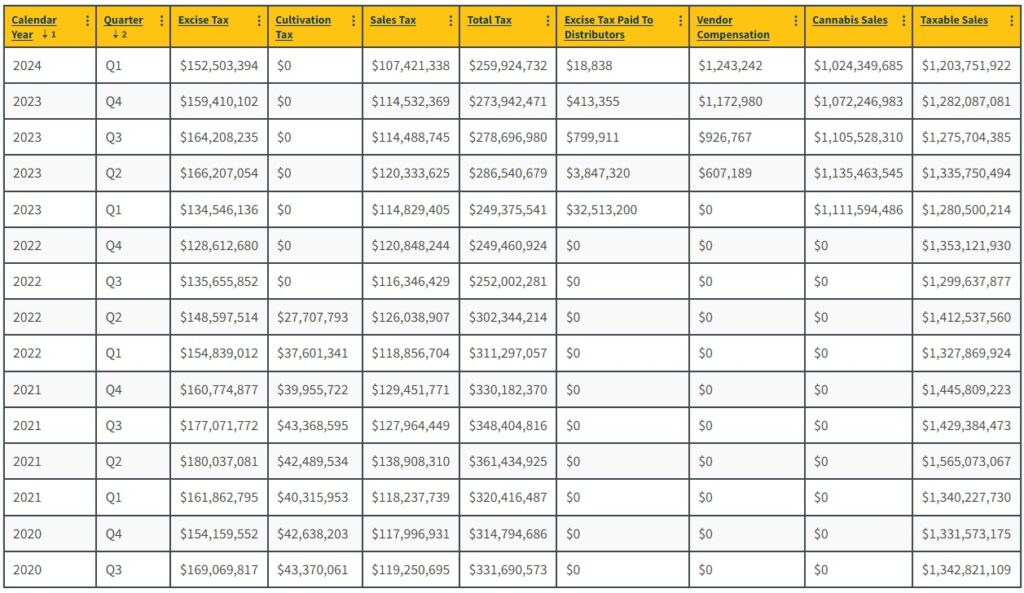California is considered by many cannabis enthusiasts to be the best state in the U.S. for cannabis. California was the first state to ever pass a medical cannabis legalization measure in 1996, and voters in California approved recreational cannabis legalization in 2016.
Unfortunately, California’s legal recreational cannabis industry has struggled since its inception, with many cannabis industry members and observers pointing to California’s overburdensome regulations and high tax rates. That struggle is evident in the sales figures for the first quarter of 2024, in which legal cannabis sales in California have fallen compared to proceeding quarters.
Below is a table of historical California legal cannabis sales data from the California Department of Tax and Fee Administration:

The 2024 Q1 sales totals in California are the lowest since the second quarter of 2020 when total sales were roughly $1.1 billion. Sales totals peaked in California in 2021 Q2 when the state’s legal cannabis industry sold over $1.5 billion worth of products.
California appears to no longer be the national leader for legal cannabis commerce. In March 2024, Michigan’s legal cannabis industry sold more products than California’s legal cannabis industry.
“Michigan now sells more legal cannabis than California, according to data shared with SFGATE by BDSA, a cannabis analytics firm.” SFGate stated in its initial reporting. “Michigan sold 22 million cannabis products in March, while California only sold 21.3 million products, according to the firm.”
SFGate did point out that the total dollar amount for sales in California in the first quarter of 2024 (over $1 billion) still topped the total dollar amount for sales in Michigan (roughly $786 million) due to Michigan having some of the lowest prices in the nation and California having some of the most expensive prices. California is still the national leader for floral hemp production by far.
“According to the USDA, more than 11 million pounds of hemp flower was produced in 2022 by 1,800 American farms covering about 10,500 acres. California produced 56% of all U.S. hemp flower, which is used to extract CBD and other cannabinoids, including intoxicating hemp-derived THC.” MJBiz Daily stated in its initial coverage.
Kentucky produces the second most floral hemp flower in the United States (1,764,736 lbs.), followed by Oregon (663,370 lbs.), and Colorado (455,100). Alameda County in California produced 5,531,832 pounds in 2022 alone.
The United States adult-use cannabis industry has generated over $20 billion in total tax revenue since the first legal recreational cannabis purchase was made in Colorado on January 1st, 2014 according to a recent report by the Marijuana Policy Project.
“Through the first quarter of 2024, states have reported a combined total of more than $20 billion in tax revenue from legal, adult-use cannabis sales. In 2023 alone, legalization states generated more than $4 billion in cannabis tax revenue from adult-use sales, which is the most revenue generated by cannabis sales in a single year.” the Marijuana Policy Project stated in a press release.
Total legal cannabis sales in the United States are expected to reach $31.4 billion in 2024 according to a recent analysis by Whitney Economics. Additionally, leading cannabis jobs platform Vangst, in conjunction with Whitney Economics, estimates that the legal cannabis industry now supports 440,445 full time-equivalent cannabis jobs in the United States.
Whitney Economics also projects the following legal cannabis sales figures in the United States for the coming years:
- 2024: $31.4 billion (9.1% growth from 2023)
- 2025: $35.2 billion (12.1% growth from 2024)
- 2030: $67.2 billion
- 2035: $87.0 billion
The emerging legal cannabis industry in the United States is projected to add roughly $112 billion to the nation’s economy in 2024 according to a newly released analysis by MJBiz Daily. The projection is part of the company’s 2024 MJBiz Factbook.
“The total U.S. economic impact generated by regulated marijuana sales could top $112.4 billion in 2024, about 12% more than last year,” MJBiz stated in its initial reporting.

